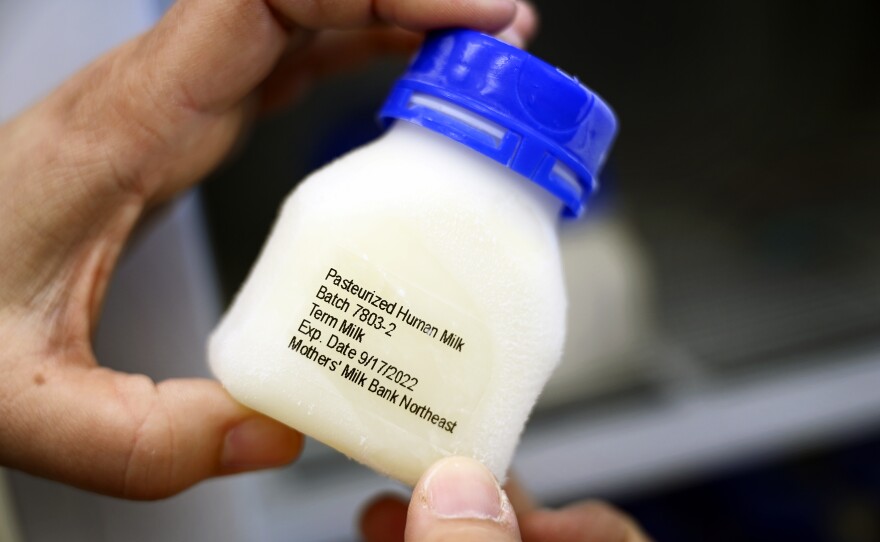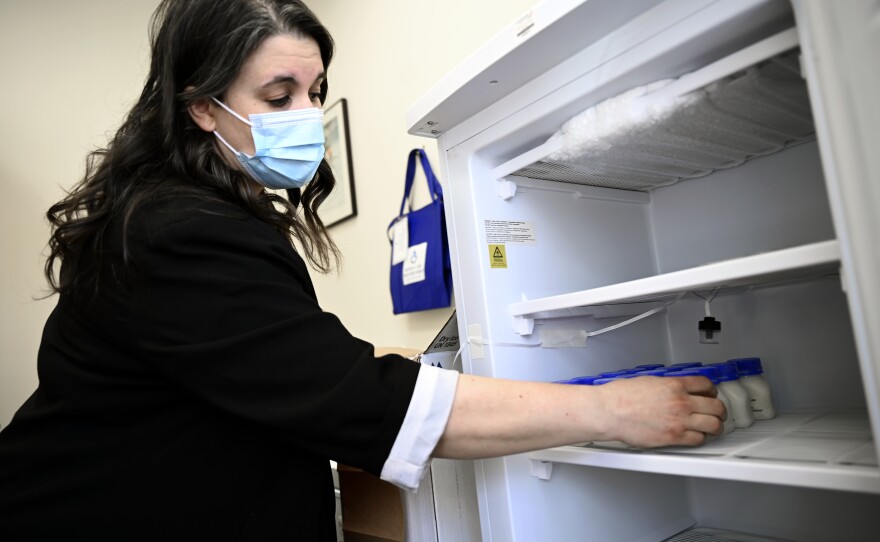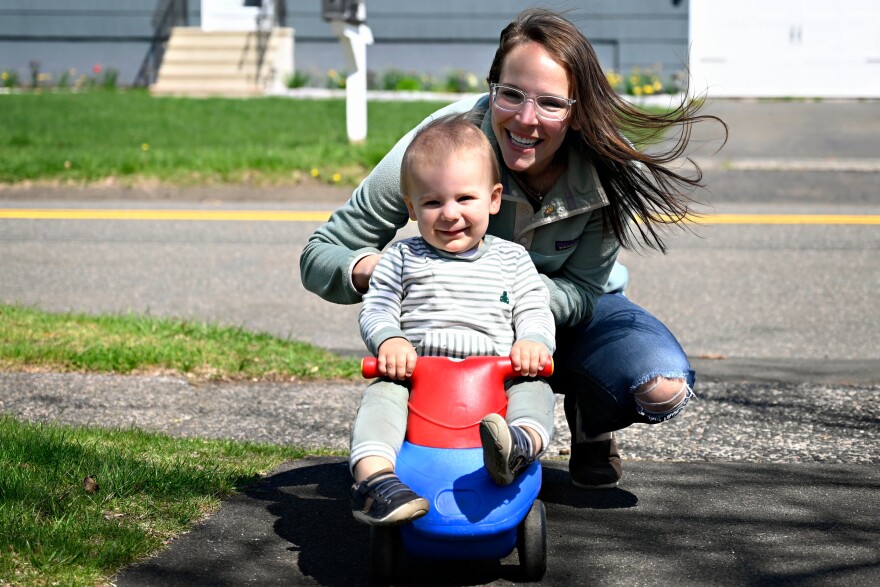‘Safe milk more accessible for everyone’: Connecticut gets first outpatient breast milk dispensary

Pasteurized donor human milk is delivered to Glastonbury Pediatrics and Adolescent Medicine, a ProHealth Physicians group in Glastonbury, Conn., on April 20, 2022. (Joe Amon/Connecticut Public)
Susan Parker walked through the offices at ProHealth Physician’s Glastonbury Pediatrics and Adolescent Medicine carrying a large white box. She set it down on a table next to a couple of small medical freezers.
“This is literally the first one,” she said before grabbing a pair of scissors and tearing open the box.
Inside were more than two dozen tiny bottles filled with frozen, pasteurized breast milk – milk donated from people across the Northeast and then screened, tested and processed at a facility in Massachusetts.
Parker, a nurse practitioner and lactation counselor, said this milk will soon go to Connecticut parents who struggle to produce enough breast milk on their own.
Most Connecticut families who’ve needed donated breast milk for their babies have gotten it while in a hospital. But there are few options once they leave, even if they still need help feeding their babies. Health providers hope a new opportunity will change that – an outpatient breast milk dispensary opens this weekend at the Glastonbury practice.
It’s the first of its kind in the state.
“So, when they come here and we can say, ‘Hey, we need to continue the supplementation, we have donor milk here, too,’ it’s such a relief,” Parker said, “and I can’t wait to be able to say that to them.”
The American Academy of Pediatrics and the World Health Organization recommend that infants be fed breast milk exclusively for the first six months of life, and they encourage breastfeeding for longer.
About 30% of children in Connecticut were exclusively breastfed through 6 months of age in 2018, according to CDC survey data. That’s up from 19% in 2011.
While breast milk is a priority, it can be difficult for some families to reach those feeding goals without assistance, said Dr. Joy Hong, a pediatrician.
“The mother may have medical reasons why she can’t breastfeed,” Hong said. “She might have had postpartum complications, for example, where her body isn’t able to make milk.”

Nurse practitioner Susan Parker transfers the first shipment of pasteurized donor human milk to one of two freezers at Glastonbury Pediatrics and Adolescent Medicine, a ProHealth Physicians group in Glastonbury, Conn., on April 20, 2022. (Joe Amon/Connecticut Public)
That’s when donor milk can serve as a bridge for families, Hong said, and provide temporary supplementation until they’re able to produce a sufficient amount of breast milk on their own for their babies.
Baby formula is an alternative option. Health experts say formula is sometimes necessary to meet a child’s nutritional needs if no breast milk is available, but there are downsides. It lacks the immunity-boosting elements that come in breast milk, and it can be more difficult to digest for some babies.
“I tell parents at prenatal visits, I say, ‘We encourage breastfeeding, we’ll support you through the process, but I’m never going to make you feel like a bad parent if you chose other ways of feeding your baby,’” Hong said.
Organized human milk banking
The new Glastonbury dispensary will partner with Mothers’ Milk Bank Northeast in Newton, Mass. It’s a nonprofit milk bank accredited with the Human Milk Banking Association of North America.
The bank screens and approves eligible donors in the Northeast, from Maine to Maryland. Once approved, those donors can drop off their excess milk at milk depots – these are community locations that store the milk and eventually ship it to the bank in Massachusetts for processing.
There are five milk depots in Connecticut.
At the main milk bank facility, donor milk is combined in batches, tested for bacteria and other viruses, pasteurized and frozen. Ann Marie Lindquist, the bank’s director of community relations, said a majority of milk goes to hospital neonatal intensive care units.
“A human milk diet is considered medicine for those babies,” she said. “As milk banks have emerged, they have been ethically obligated to serve those needy babies first.”
Over time, Lindquist said the milk bank has been able to open outpatient dispensaries. It currently oversees seven, all of them located in New England.
“As awareness of donor milk has increased, and supply has increased and the number of milk banks has increased, all of our milk banks have been able to serve a broader population,” she said.
Experts say preference for breast milk is growing as education around its benefits reach more parents. But for struggling families, access to donor milk hasn’t yet caught up.
An outpatient dispensary offers safe, regulated donor breast milk. But it comes at a cost of about $4.20 an ounce. There are some limited financial assistance options, Lindquist said, but they are dependent on financial donations.
There can also be slight delays for families to receive milk – they first need a prescription from a doctor or nurse. And then there has to be supply available.
With those hurdles, plus a limited number of dispensaries, there’s been growth in more informal – and unregulated – ways to get breast milk.

Taylor Harold pushes her 16-month-old son, Theo, on a scooter in the driveway of their home in North Haven, Conn., on April 22, 2022. (Nicole Leonard/Connecticut Public)
Informal milk-sharing networks grow
Grassroots organizations like Human Milk 4 Human Babies have attracted thousands of parents and families. The organization’s state chapters operate mostly on social media and help connect parents with excess breast milk to parents in need.
Taylor Harold found the Connecticut chapter online when she built up a surplus of frozen breast milk with her 16-month-old son, Theo.
“Our freezer was full and I needed to find someone, I just kind of kept accumulating it,” Harold said, talking outside her home in North Haven as Theo played on a scooter in the driveway.
The U.S. Food and Drug Administration discourages informal breast milk sharing, citing risks and safety concerns for untested milk. But the practice isn’t illegal, and organizations like Human Milk 4 Human Babies have established protocols to limit some risks.
Harold said many donors will share their medical histories, diets and lifestyles when posting their donation offers.
“From my side, it’s like, OK, I know I’m healthy and I’m washing my hands and I’m not doing any type of harmful behaviors. I’m just a regular mom kind of thing,” Harold said. “You would think that the majority of people who are willing to donate their milk probably fall into that same category.”
Most informal milk-sharing networks forbid the sale of breast milk, ensuring there’s no financial incentive for a donor to tamper with the milk.
It means the donations are free for the receiving parents. It’s also been convenient for families who can’t get to a dispensary and have an immediate need.
“It’s good,” Harold said. “You want to be able to give it to someone who needs it.”
Informal community sharing came out of necessity, said Parker, the nurse practitioner and lactation counselor in Glastonbury. She believes the state’s first regulated dispensary is a step in the right direction.
“So, what we’re trying to do is make safe milk more accessible for everyone,” she said.
She hopes the dispensary is just the beginning of giving families more options to feed their babies.
